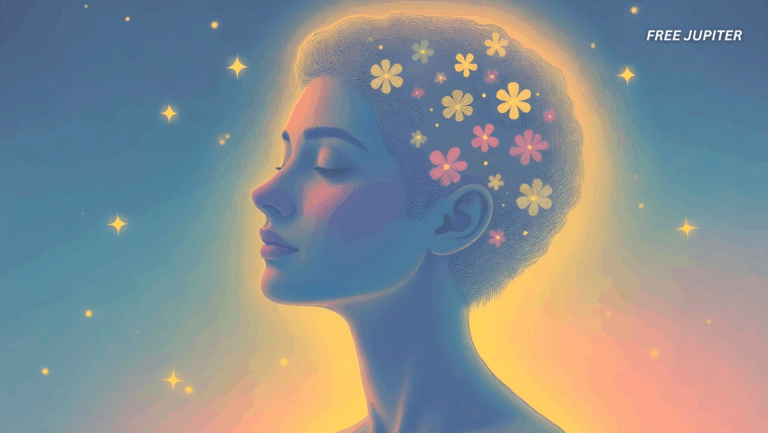Friendly Note: FreeJupiter.com shares general info for curious minds 🌟 Please fact-check all claims—and always check health matters with a professional 💙
Dreams have long fascinated humanity, stirring debate about their significance. Some view dreams as spiritual messages offering guidance, while others see them as the brain’s way of processing daily experiences and emotions. Among the many types of dreams, those featuring someone who has passed away hold a special place, often evoking strong feelings. But what might it mean when a departed person visits you in your dreams?
Emotional Impact and Common Experiences
Dreams about deceased individuals often stir a complex mix of emotions. For some, these dreams bring comfort and a sense of connection, while for others, they may evoke sadness or unresolved feelings. Such dreams are quite common, especially soon after a loved one’s passing, and are frequently considered part of the natural grieving process.
However, when these dreams occur long after the loss, they might symbolize something different. They can reflect transitions or changes happening in your own life. For example, a dream about someone who died years ago might coincide with a major life event like moving to a new city, starting a new job, or finishing school. In this context, the “death” in the dream may not be literal but rather a metaphor for endings and new beginnings in your personal journey.
Read more: The First Communication Between Two Humans While Dreaming Has Been Achieved – This Is How It Works
Understanding the Feelings in Your Dream
Experts emphasize that the emotional tone of a dream is often more revealing than the specific details. How you feel during and after the dream-whether peaceful, anxious, or unsettled-can provide clues about its meaning. Dreams frequently use symbolism rather than straightforward narratives, so interpreting them requires tuning into your own emotional responses.
Dr. Rubin Naiman, a psychologist specializing in sleep and dreams, describes dream interpretation as a way to “decode” the subconscious, expanding our psychological awareness. He notes that dreaming of someone who has passed away often relates to changes in life and the feelings those changes bring, whether anxiety or acceptance.
Scientific and Cultural Perspectives on Dreaming
From a scientific viewpoint, some neuroscientists suggest that dreams occur during REM sleep as the brain performs maintenance tasks, and the images we see might be random “visual dust.” In this view, dreams have no inherent meaning.
Conversely, many indigenous cultures, such as Aboriginal Australians, regard dreams as deeply meaningful and integral to spiritual existence. They see dreaming as a bridge to a broader consciousness, where messages from ancestors or spiritual guides may be received.
Four Common Interpretations of Dreams About the Deceased
Dream analysts and psychologists have outlined several common reasons why someone might dream of a departed loved one:
- Grieving Process: The most straightforward explanation is that your mind is working through the pain of loss. Dreams can serve as a safe space to experience and process grief.
- Projection of Emotions: Sometimes, the dream reflects your own feelings. If the deceased appears angry or disappointed, it might mirror your internal guilt, regret, or unresolved issues with them.
- Self-Reflection and Warning Signs: According to dream analyst Lauri Loewenberg, dreaming of a deceased person may highlight behaviors or patterns you recognize in yourself, especially if the person had struggles like addiction or reckless habits. The dream might be a subconscious alert to avoid similar pitfalls.
- Visitation Dreams: Some believe that these dreams are actual visits from the departed, offering comfort, guidance, or warnings. Signs that a dream might be a visitation include the loved one appearing healthy, happy, and peaceful, and the dream leaving you feeling calm and reassured.
The Role of Visitation Dreams
Visitation dreams are a special category where the deceased seems to appear with a clear message or presence. These dreams often happen after a recent loss but can also occur later. They may feature symbolic elements, such as the loved one standing across a bridge, representing the divide between life and death.
While some may find the idea of spiritual visitations far-fetched, many who experience these dreams report a profound sense of peace and closure. Dream experts suggest that whether or not the visitation is “real” is less important than the emotional healing it fosters.
Read more: The Chilling Story of the First Humans to Be Cryonically Preserved
Processing Unfinished Business and Emotions
Dreams of the deceased can also represent unresolved feelings or conversations left incomplete. They provide an opportunity for the subconscious to work through guilt, regret, or longing. For instance, if you had conflicts or things left unsaid, your dreams might offer a chance to express those emotions symbolically.
These dreams can also highlight your ongoing connection to the person, reminding you of their influence or the qualities you admired in them. Sometimes, the dream serves as a comforting reminder that the bond remains, even after physical separation.
Psychological Perspectives: The Dream as a Reflection of Self
From a psychological standpoint, dreaming of someone who has passed away can be a mirror of your own inner state. The deceased in your dream might represent parts of yourself-traits, memories, or unresolved issues. Engaging with the dream scenario, rather than rejecting it, allows your mind to explore these aspects more fully.
Grief counselors often emphasize that the benefits of such dreams lie in the emotional experience they provide. Whether the dream is a spiritual visitation or a psychological process, it can help you find solace, understanding, and a sense of connection.
Read more: World’s First Recording Of Moment Someone Passes Reveals What Our Last Thoughts Are
Bridging Science and Spirituality
While science tends to view dreams as brain activity without inherent meaning, spiritual traditions see them as gateways to deeper wisdom. Both perspectives offer valuable insights: the scientific approach helps us understand the mechanics of dreaming, while the spiritual view honors the emotional and symbolic richness of these nocturnal experiences.
Ultimately, dreams about those who have passed can serve multiple purposes-helping us grieve, reflect, warn, or simply reconnect. Paying attention to how these dreams make you feel and what they might be trying to communicate can enrich your understanding of yourself and your journey through life and loss.
This exploration of dreams involving deceased loved ones reveals a fascinating intersection of emotion, psychology, and culture. Whether viewed as symbolic messages, psychological reflections, or spiritual visits, these dreams offer a unique window into how we process loss and change. They remind us that even in absence, connections endure, often finding expression in the quiet, mysterious world of dreams.










